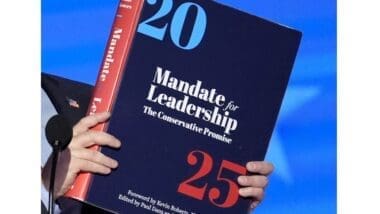In a move that has raised eyebrows across the political spectrum, President-elect Donald Trump is appointing key figures associated with Project 2025, a document outlining a significant shift to the right, despite previously dismissing its relevance during his campaign.
Donald Trump, after denying involvement with Project 2025 during his campaign, is now embracing its contributors for major roles in his administration. This development follows his victory as the 47th president of the United States. Among the appointees, Russell Vought has been selected once again for the director of the Office of Management and Budget, a position he previously held under Trump. Vought’s role requires Senate confirmation, and he has made clear his intention to wield significant power, advocating for the OMB to be deeply involved in White House policy processes.
Vought’s past comments emphasize his ambition to challenge federal bureaucracy. On a podcast hosted by former Trump aide Steve Bannon, Vought expressed eagerness for confrontation, stating, ‘We’re not going to save our country without a little confrontation.’ His appointment has drawn criticism from Democrats who fear the implications for the federal government’s functioning, citing concerns over potential radical shifts in U.S. policy.
The appointment of Vought and others aligns with Trump’s strategy to enhance presidential control over the federal apparatus, a theme present in both Project 2025 and his campaign proposals. Notably, Trump plans to reimplement changes to the federal civil service, previously initiated during his first term, that were reversed by President Joe Biden. These changes involve reclassifying tens of thousands of civil service workers to make them easier to dismiss and replace, signaling a stark shift in federal employee dynamics.
Stephen Miller, a long-serving adviser and architect of Trump’s immigration policies, is tapped to serve as deputy chief of policy. Miller’s appointment does not require Senate confirmation, and he is expected to remain influential in shaping immigration policies, including the controversial ‘America First’ approach.
The appointments also extend to other influential roles, such as John Ratcliffe, previously director of national intelligence, now selected to lead the CIA. Ratcliffe and Brendan Carr, chosen to chair the Federal Communications Commission, are Project 2025 contributors. Carr advocates for stringent rules on major tech platforms to promote diverse political viewpoints.
This new wave of appointments emphasizes Trump’s intent to overhaul and centralize power in the federal government. Critics argue that these moves could lead to significant changes affecting various aspects of American life, from immigration to fiscal discipline.
With Donald Trump appointing key Project 2025 figures to influential positions, the political landscape is poised for substantial shifts. These appointments highlight a broader strategy to consolidate power within the presidency and effectuate sweeping changes in U.S. governance, prompting both support and concern from various quarters.
Source: AP News














